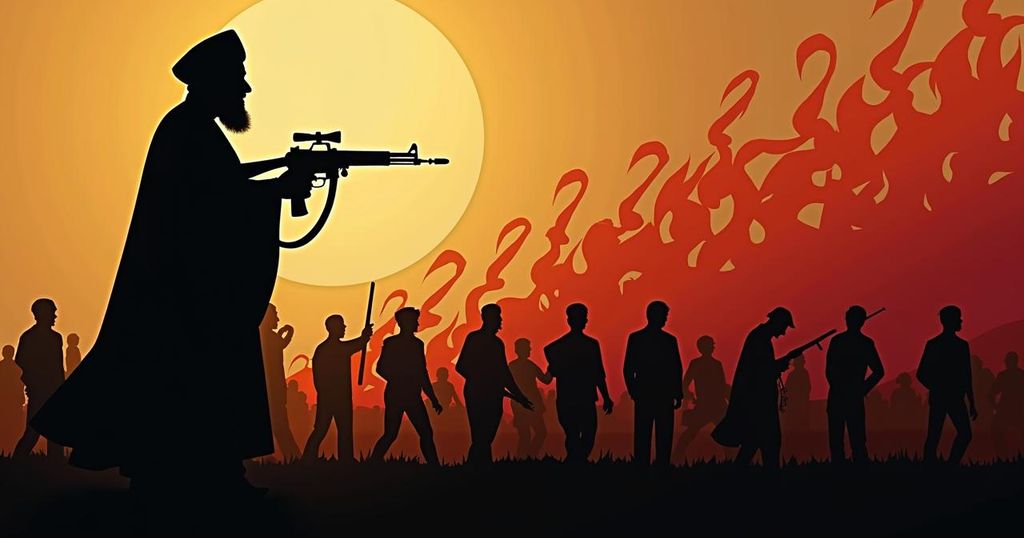Iran has vowed to avenge the death of Hezbollah leader Hassan Nasrallah, killed in an Israeli airstrike. Ayatollah Khamenei announced a five-day mourning period, framing Nasrallah as a martyr whose legacy will endure. The airstrike has caused concerns of escalating conflict in the region, especially after ongoing hostilities between Israel and Hezbollah. Reports indicate Khamenei is in secure communications with Hezbollah as both groups assess their responses to this significant loss.
Iran has declared that the death of Hassan Nasrallah, the leader of Hezbollah, will not go unavenged following his recent killing in an Israeli airstrike in Lebanon. Ayatollah Ali Khamenei, Iran’s supreme leader, announced five days of mourning and referred to Nasrallah as a martyr and a significant ideological figure whose influence would persist. Iranian media reported that an Iranian Revolutionary Guards general was also among the casualties from the strike, indicating widespread repercussions from this incident. Meanwhile, Israel’s military justified the strike, claiming that Nasrallah bore responsibility for numerous deaths and was involved in orchestrating imminent attacks against Israel. The recent developments have raised concerns over potential escalations in conflict within the region, particularly following a year of increased hostilities stemming from cross-border skirmishes between Israel and Hezbollah, particularly after the events of October 7 and the ongoing conflict in the Gaza Strip. The implications of these events hinge significantly on the responses of Ayatollah Khamenei, who has thus far avoided declaring direct retaliation against Israel despite previous humiliating setbacks suffered by Hezbollah. This caution appears to stem from Iran’s desire to avoid escalating into full-scale conflict with Israel. Likewise, Iran has not acted on threats to avenge the assassination of Hamas leader Ismail Haniyeh earlier in July. Khamenei has called on Muslims globally to lend support to Hezbollah but has refrained from directly promising retaliation for Nasrallah’s death, suggesting that the fate of the region will depend on the actions of resistance forces led by Hezbollah. Reports indicate that Khamenei has been relocated to a secure site and remains in constant communication with Hezbollah and allied groups to assess their next strategic moves following the airstrike, which targeted key Hezbollah leadership in the southern suburbs of Beirut. Additionally, the Iranian Revolutionary Guards Corps (IRGC), which significantly funds and equips Hezbollah, lost General Abbas Nilforoushan in the airstrike, signaling a substantial blow to Iranian backing of the group. Overall, the dynamics of resistance movements across the Middle East may be reshaped, with the IRGC’s coordinative role being crucial to the ongoing conflicts that pit these groups against both the United States and Israel.
This article discusses the aftermath of the Israeli airstrike that resulted in the death of Hassan Nasrallah, the leader of Hezbollah, and the broader geopolitical implications for Iran, Hezbollah, and the region. It highlights the historical context of heightened tensions between Israel and Hezbollah, particularly in light of recent conflicts in Gaza and cross-border skirmishes. Given the strategic nature of Iranian support for Hezbollah through the Islamic Revolutionary Guards Corps (IRGC), the death of Nasrallah may catalyze Iran’s responses in the region, either through direct military engagement or by enhancing support for its proxies. The implications of this incident could mark a significant turning point in the already volatile relationships within the Middle East.
The assassination of Hassan Nasrallah by Israeli forces marks a critical juncture in Middle Eastern geopolitics, potentially escalating existing tensions between Israel and Iran-backed entities such as Hezbollah. While Iran’s leadership has vowed that Nasrallah’s death will not remain unanswered, there remains a delicate balance between demonstrating resistance and avoiding a broader conflict. The next steps taken by Ayatollah Khamenei and the IRGC will be crucial in shaping the future strategic landscape of the region.
Original Source: www.bbc.com







